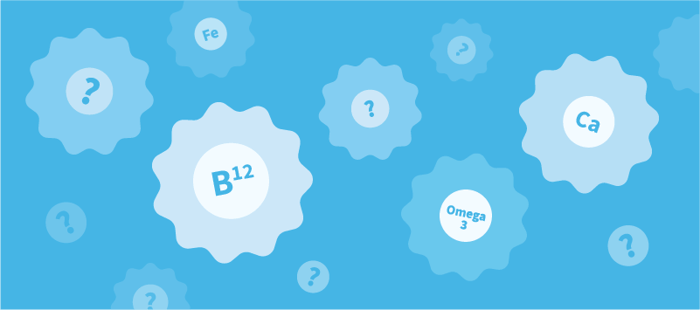Table of Contents
Deciding to adopt a vegan lifestyle can lead to a healthier you and a happier planet. It’s a significant step, eliminating all animal products from your diet, raising questions about nutritional completeness. The concern often revolves around whether a plant-based diet can supply all the essential nutrients your body requires.
Yes, a vegan diet can be well-rounded and nutritionally complete, but it requires careful planning and a bit of know-how about plant-based nutrition. This means understanding what your body needs and where to find those nutrients in the plant kingdom.
In this discussion, we'll delve into the fundamentals of a vegan diet, highlighting the varieties of plant-based foods that are nutrient-dense and which essential nutrients vegans should focus on to maintain a balanced diet. By the end of this guide, you'll be equipped with the knowledge to navigate the vegan diet confidently and healthily.
What Is A Vegan Diet?
 Diving into veganism, you enter a realm where no animals are harmed for our sustenance. This ethical lifestyle choice extends far beyond the absence of meat such as beef, pork, chicken, or seafood found in vegetarianism.
Diving into veganism, you enter a realm where no animals are harmed for our sustenance. This ethical lifestyle choice extends far beyond the absence of meat such as beef, pork, chicken, or seafood found in vegetarianism.
Vegans embrace a compassionate diet devoid of all animal-derived ingredients. This not only excludes obvious items like dairy and eggs but also extends to the finer details where animal byproducts may lurk—like gelatin in candies and honey in sweeteners.
By understanding the comprehensive scope of veganism, we can appreciate the depth of commitment it represents and explore the plant-based alternatives that offer both variety and nutrition.
Types Of Vegan Diets
Veganism is a tapestry of choices, each thread representing a different motivation and approach to this plant-based lifestyle. Whether driven by compassion for animals, ethical vegans, or a commitment to Earth's well-being, environmental vegans, the core principle remains the same—avoiding animal products. Yet, within this community, diversity flourishes, and various interpretations of a vegan diet have emerged:

- Raw Veganism: Some believe that heat can diminish the nutritional value of foods, potentially degrading enzymes and essential nutrients. Raw vegans, therefore, consume foods in their most natural state—uncooked and unprocessed—to preserve their vitality.
- Whole Food Veganism: Despite veganism's healthful reputation, not all vegan foods are created equal. Whole food vegans focus on the purity of their plates, emphasizing unprocessed fruits, vegetables, grains, and legumes, and eschewing vegan junk food that can be just as detrimental as its non-vegan counterparts.
- High Carb Low Fat Veganism: While veganism naturally curtails saturated fat intake, HCLF followers take this to an extreme. They build their diet around high carbohydrate sources while strictly limiting even plant-based fats like oils, nuts, and avocados to ensure a low-fat regime.
- Plant-based Diet: This term often serves as an umbrella for diets that prioritize plant foods while not strictly eliminating animal products. Plant-based eaters typically focus on plants but may occasionally include animal products, making it a less stringent, more flexible approach than veganism.

Benefits Of The Vegan Diet
Veganism is more than a dietary choice—it's a pathway to a plethora of health and environmental benefits. Here's how embracing a vegan lifestyle can be transformative:

- Cardiovascular Well-being: By bypassing animal products, vegans cut out primary sources of saturated and trans fats linked to heart ailments. The diet's emphasis on whole foods can contribute to lower cholesterol levels, regulated blood pressure, and a healthier heart.
- Weight Management: Transitioning to a vegan diet often results in a natural reduction in calorie intake and an increase in nutrient-dense foods. This shift can be a catalyst for weight loss and improved management of conditions like type 2 diabetes, as supported by numerous studies.
- Antioxidant-Rich Nutrition: Plant-based diets are inherently rich in antioxidants, thanks to an abundance of fruits and vegetables. These powerful compounds combat oxidative stress and can provide a shield against chronic diseases, including some cancers.
- Environmental Stewardship: Veganism extends its reach beyond personal health, offering a profound environmental impact. The diet significantly reduces the demand for resources required for animal farming, which is a notable contributor to greenhouse gas emissions. By going vegan, individuals take an active role in preserving our planet's ecosystems for future generations.
What Are The Nutrients Vegans Need?

Embarking on a vegan journey means rethinking where your nutrients come from. While plant-based diets are naturally abundant in many vital nutrients, there are some essentials that traditionally depend on animal products. Fortunately, nature has provided a wealth of plant-based alternatives that deliver these nutrients in abundance.
This guide will introduce you to the critical nutrients to be mindful of in a vegan diet. We'll explore how to harness the power of plants to meet your dietary needs for protein, vitamins, minerals, and more, ensuring your transition to veganism is nutritionally sound and satisfying.
Stay tuned as we delve deeper into each nutrient, highlighting the plant powerhouses that will keep your body thriving on a vegan diet.
1. Protein
Protein, a crucial macronutrient for cellular and muscle health, is abundantly available in a vegan diet. Variety is the secret to meeting your protein needs; include a mix of legumes, whole grains, nuts, and tofu across meals.
Simple Swaps for Sufficient Protein:
- Swap out traditional grains for quinoa, a complete protein source.
- Choose beans and lentils in salads, soups, and stews.
- Snack on nuts and seeds for a quick protein fix.
Leverage Plant-based Supplements:
- Enhance your intake with vegan protein powders from peas or hemp, perfect for shakes or baking.
2. Vitamin B-12
Vitamin B-12 is vital for DNA synthesis and maintaining healthy red blood cells. Vegans can smartly source this nutrient to support their well-being.
Natural Sources for Your Vegan Plate:
- Sprinkle nutritional yeast on dishes for a cheesy flavor plus a B-12 boost.
- Incorporate nori, the seaweed star, in your meals for a B-12 lift.
Supplemental Support:
- Consider a B-12 supplement or a B-complex vitamin to ensure you're meeting your needs.
- Look for fortified plant milks and cereals as an additional B-12 source.
A little creativity and knowledge can go a long way in keeping your vegan diet nutritionally complete with adequate Vitamin B-12.
3. Iron
Iron plays a pivotal role in oxygen transport within the body, and a vegan diet requires careful planning to maintain adequate levels.
Plant-Powered Iron Sources:
- Boost your meals with iron-rich options such as lentils, chickpeas, hemp seeds, and cashews.
- Dark leafy greens like spinach are also excellent for adding non-heme iron to your diet.
Absorption Tips:
- Combine iron-rich foods with vitamin C sources like oranges or bell peppers to enhance absorption.
- Consider cooking in cast iron cookware, as it can increase the iron content of your food.
Supplemental Strategies:
- If you opt for an iron supplement, choose one that's gentle on the stomach and vegan-certified.
- Look for cereals and plant-based milks fortified with iron as an additional boost.
4. Omega-3 Fatty Acids
Essential for brain health, anti-inflammatory responses, and cellular function, Omega-3 fatty acids must be sourced thoughtfully in a vegan diet.
Natural Omega-3 Powerhouses:
- Integrate flaxseeds, chia seeds, and walnuts into your meals for a hearty dose of ALA Omega-3s.
- Hemp seeds and edamame are additional plant sources that contribute beneficial fats to your diet.
Supplementing Smartly:
- Vegan microalgae supplements are a direct source of EPA and DHA, bypassing the need for your body to convert ALA.
- Look for high-quality vegan supplements that have been third-party tested for purity and potency.
5. Zinc
Zinc is pivotal for immunity, cellular division, and metabolism. Vegans must be proactive in incorporating zinc into their diet due to the potential for deficiency.
Plant-Based Zinc Sources:
- Incorporate a variety of legumes, nuts, seeds, and whole grains, which are zinc-rich.
- Prioritize sprouted seeds and legumes, as sprouting can increase the bioavailability of zinc.
Supplementation Tips:
- A dedicated zinc supplement can bolster your intake, especially during cold and flu season.
- Multivitamins with zinc are a convenient way to ensure you're covering your nutritional bases.
6. Calcium
Calcium is crucial for maintaining strong bones and teeth. Vegans must find alternative sources of calcium to replace dairy products.
Plant-Based Calcium Solutions:
- Explore calcium-fortified alternatives such as almond, soy, or rice milks, which can seamlessly integrate into meals.
- Embrace leafy greens like kale, collard greens, and broccoli for their calcium content.
- Tofu set with calcium sulfate and calcium-rich tahini are excellent additions to vegan dishes.
Supplemental Guidance:
- A daily calcium supplement can be a prudent addition, especially if dietary intake falls short.
- Look for vegan-certified supplements to ensure they align with your dietary ethics.


